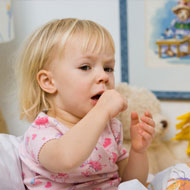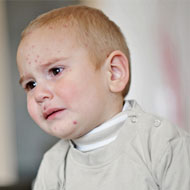Coping With Hitting Tantrums In Toddlers
Tantrums are a part of the growing process in a toddler’s life. All parents go through it, some more than others. Tantrums are a way of indicating frustration or anger that the toddler is experiencing but can’t fully express.
The problem with tantrums is that if as a parent you give in, they become a common occurrence. This is especially so in the case of tantrums which involve lots of kicking, hitting, biting and other such behavior that could injure the parent, the toddler or an onlooker. Toddler breath holding and toddler door slamming are probably the two most common types of tantrums.
How to cope with Toddler Hitting Tantrums
Stay Calm
When your toddler is slamming doors, holding his breath, or screaming and kicking, it is easy to lose your temper. However, this is detrimental to the cause. Your toddler is probably experiencing great confusion and frustration during the tantrum. Yelling at him will only aggravate him or scare him, prolonging the tantrum. This time due to fear more than anything else. It is essential to stay calm and maintain authority during such situations. Your toddler needs to know you are the boss.
Be Firm But Reassuring
Parents have a hard time dealing with toddlers throwing violent tantrums. What you need to do is be firm but reassuring. Don’t give in to the tantrum, but try to calm the toddler down. Studies have shown the benefits of human touch; try to gather your toddler in a warm hug. Talk to him rationally while holding him. Explain that you understand why he is angry. Then explain why he shouldn’t be angry. Sometimes putting his feeling into words is all he needs to calm down.
Re-direct Attention
One way to tempering down a tantrum is to redirect the toddler’s attention from the trigger to something interesting. Stories and toys work as excellent distraction devices. If the toddler is in the midst of a full blown tantrum, chances are toys won’t deter him. In such a case, leave the room for a few minutes. He will calm down himself.
It’s Not OK to Hit
Kids don’t understand how disruptive or harmful their tantrums can be. They use these as a means to gather attention. At times it’s the only way they can communicate. It is important to educate your toddler about such behavior being wrong. You have to teach him that it is not ok to hit another person. If left unchecked it can develop into a serious problem in the child’s playgroups. Differentiate between good behavior and bad behavior; good actions and bad actions; and good words like please and thank you.
Reward Good Behavior
Each time he responds with good behavior reward the toddler. Alternate between praise and treats; you don’t want the reward to be misconstrued as a bribe. You can also utilize behavior charts, wherein good behavior for the day is marked by colorful stickers.


